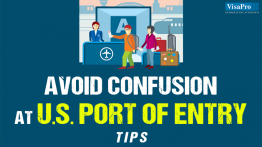Introduction
Many employers often get concerned about employing foreign students and graduates as interns because they are unsure of what the related obligations will be.
Contrary to any fears, employing foreign students and graduates as interns is not as difficult as many employers think.
My Case Scenario
Linda
Linda, an HR Manager at a California-based technology company has been recently asked by her company to recruit technology and business students and recent graduates for internship positions. While conducting recruitment, she came across many qualified foreign national students and recent graduates who appeared eligible to be engaged as interns. Linda, however, was not sure whether they could be hired.
There were many doubts that she and her company had including:
- Can U.S. companies engage foreign students and graduates as interns?
- Will the company or the students/recent graduates be required to undergo complicated immigration procedures to obtain a visa?
- Can the foreign national intern be offered full-time employment upon completion of the internship?
For more information keep reading.
Visa Options For Internships In USA For International Students
U.S. companies and employers who wish to employ foreign students and graduates as interns, have several USA intern visa options to choose from.
For the benefit of U.S. companies who would like to employ foreign students and recent graduates as interns, as well as foreign nationals who would like to take advantage of internships in USA, we present here, a snapshot of several visa types for USA internships.
1. Employing F-1 Students As Interns
Foreign students who are on F-1 status in the U.S. are not permitted to work off-campus during the first academic year.
F-1 students, however, may be allowed to seek off-campus employment after the first academic year through “practical training”.
There are two types of practical training:
- Curricular Practical Training (CPT)
- Optional Practical Training (OPT)
IMPORTANT
The foreign student must be maintaining his or her F-1 status in order to be eligible to seek practical training.
1a. Employing F-1 Students Under CPT Internship
Curricular Practical Training (CPT) is alternative work/study, internships, cooperative education, or any other type of required practicum that is offered by sponsoring employers through cooperative agreements with the school. The employment or internship must be a part of an established curriculum at the student’s school of higher education. Upon endorsement from the Designated School Official (DSO) on the student’s I-20 (includes the name of the company, beginning and ending dates of employment, and signature of the DSO on the back of the I-20), the student may begin the internship.
Employers who wish to engage schools and foreign students as interns should speak to the respective schools as CPT must be part of an established curriculum.
REMEMBER
Employers engaging F-1 students who are on CPT will be required to record the foreign passport and I-94 numbers in Section 2 under ‘List A’ of Form I-9, and write the SEVIS number and the program expiration date from the Form I-20 in the margin of Form I-9 near Section 2.
1b. Employing F-1 Students Under OPT
Optional Practical Training (OPT) is temporary employment that is directly related to an F-1 student’s major area of study. OPT is intended to provide practical experience in an F-1 student’s major area of study and may generally not exceed 12 months except in certain circumstances where STEM students may extend for an additional 17 months.
An F-1 student may be authorized to participate in OPT during studies (Pre-Completion OPT), and/or after completion of studies (Post-Completion OPT).

1b-i. Employing F-1 Students Under Pre-completion OPT
Employers who wish to employ foreign national students on OPT internship during the academic year must note that, while an F-1 student may be authorized to participate in pre-completion OPT after he/she has been enrolled for one full academic year, there are restrictions on the number of hours such students can be employed off-campus during the academic semester. Also, the pre-completion OPT must be directly related to the student’s course of study.
An F-1 student may work pursuant to pre-completion OPT:
- For up to 20 hours per week while school is in session; or
- Full-time during the student’s annual vacation and at other times when school is not in session.
IMPORTANT
In order to work, the F-1 student on OPT must obtain an Employment Authorization Document (EAD) issued by the USCIS. The EAD establishes the student’s identity and employment authorization.Foreign national students may begin employment only after they receive the EAD, which will indicate the starting date and ending date of the employment authorization. They are required to have the work authorization only before they begin the actual employment, and not before they are offered employment.
Employers employing foreign graduates as interns on OPT, should record the Alien Registration Number, card number and expiration date under ‘List A’ in Section 2 of Form I-9. Once the EAD expires, employers must re-verify the employee’s employment authorization in Section 3.
1b-ii. Employing F-1 Students And Foreign Graduates Under Post-Completion OPT
An F-1 student may be authorized to participate in post-completion OPT upon completion of studies.
While employing foreign graduates under post-completion OPT, employers must keep in mind that the post-completion OPT must be directly related to the student’s course of study.
And, as noted above, F-1 students on OPT must obtain an EAD before they can commence employment. Further, students who work full-time on CPT for one year or more, may not be eligible for OPT.
DID YOU KNOW?
1. While F-1 students may generally be authorized to receive only up to 12 months of OPT either pre- and/or post- completion of studies, students who receive designated science, technology, engineering, and mathematics (STEM) degrees and who receive an initial grant of post-completion OPT, may apply for a 17-month extension for a maximum of 29 months of post-completion OPT. Thus, in certain circumstances, foreign national graduates may be employed by U.S. companies for up to nearly 29 months on OPT.
2. An employer must be enrolled in E-verify in order for an F-1 student on OPT to be eligible for the 17-month STEM extension.
2. Employing J-1 Students Under Academic Training
Foreign national students who are in the U.S. as a J-1 student may be eligible to be employed in areas related to their academic field of study under ‘Academic Training’ (AT).
AT may be authorized by the J-1 program sponsor and does not need to be adjudicated by USCIS. AT may occur during and after the completion of studies and the duration can vary but cannot be longer than the academic program.
Generally, for degree programs, the maximum period is 18 months. Academic Training is generally part-time during the academic year. During vacations, J-1 students may engage in AT full-time or part-time.
IMPORTANT
While hiring foreign nationals on J-1, employers must keep in mind that a two-year home residency requirement may be applicable to some J-1 visitors. Interns subject to this requirement will be required to return to their home country for two years before they can obtain other nonimmigrant visas (e.g. H or L) or become a permanent resident. There are no exceptions if the foreign national is subject to the home residency requirement, but he or she may be eligible for a J-1 waiver of this requirement.
3. Employing Foreign Students And Recent Graduates Under A J-1 Internship or Training Program
Employers who wish to employ a foreign national student pursuing a degree outside the U.S. or a foreign national who has recently graduated from a college or university outside the U.S., may find the J-1 internship or training programs appropriate in their situation.
J-1 internship programs are designed to allow foreign college and university students or recent graduates to come to the United States to gain exposure to U.S. culture and to receive hands-on experience in U.S. business practices in their chosen occupations.
Under a J1 internship program, foreign interns are permitted to work in the U.S. for up to 12 months.
J-1 training programs are designed to allow young people who have already graduated from college or a professional certificate program and have 1 year of experience abroad, or have 5 years of experience abroad to come to the United States to gain exposure to U.S. culture and to receive hands-on experience in U.S. business practices in their chosen occupational field.
Under a J-1 training program, foreign national interns may be permitted to work in the U.S. for up to 18 months.
REMEMBER
Employers who wish to employ foreign nationals under a J-1 internship or training program must contact a ‘Designated Sponsor’. Designated Sponsors are the organizations that administer the exchange program and can also connect employers with foreign national participants of the J-1 program.
J-1 Program – Eligibility and Restrictions
Eligibility
Under the J-1 internship program, U.S. employers may employ foreign nationals as interns if:
- they are currently enrolled in and pursuing studies outside the United States; or
- they have graduated from a college or university outside the United States no more than 12 months prior to the internship program start date.
Under the J-1 training program, U.S. employers may employ foreign national as trainees if:
- they have graduated from college or university or have a professional certificate and 1 year of experience abroad; or
- they have 5 years of related experience abroad.
Restrictions
Under a J-1 internship or training program, interns cannot work:
- in positions that require more than 20 percent clerical or office support work;
- in unskilled or casual labor positions;
- in positions that require or involve childcare or elder care;
- in positions that involve medical patient care or contact.
Continuing Employment After U.S. Internship Program
It is not uncommon for employers to want to offer employment and hire bright interns upon completion of the internship period.
Employers who wish to hire a foreign national intern for a long-term position must keep in mind a few additional factors, make suitable plans and take timely steps to ensure that there is no break in employment of such interns and if there is, that it does not disrupt the company’s goals or functions.
A. In The Case Of F-1 Students
In the case of F-1 students who are on OPT, the employment authorization terminates at the conclusion of the authorized practical training, usually indicated on the EAD.
In order to have these students continue employment beyond such period, the foreign national and the employer must petition to change the foreign national’s status. The most popular option is the H-1B visa status. In fact, USCIS has created a specific provision that allows students whose OPT’s are expiring to continue employment if the H-1B petition is filed before the OPT ends – commonly referred to as “Cap-Gap”.
B. In The Case Of J-1 Students
In the case of J-1 students on Academic Training or foreign nationals on J-1 intern/trainee visas, employers must keep in mind that a two-year residency requirement may be applicable to some J-1 visitors.
Interns subject to this requirement will be required to return to their home country for two years at the end of their program, and they will generally not be able to change to H status until they have spent 2 years outside the U.S. or have obtained a J-1 waiver of the requirement, which in turn would affect the employers plans to continue them in employment after completion of the internship period.
If the J-1 visa holder does not have the 2-year residency requirement, the foreign national and the employer must petition to change the foreign national’s status. The most popular option is the H-1B visa status.
However, unlike for F-1 OPT, there are no special cap-gap provisions. The J-1 and H-1B must be timed so precisely to avoid any gaps of employment.
C. F-1 OPT To H-1B: Changing Immigration Status
Employers need to keep the following in mind while planning to do a change of status for an intern from F-1 OPT to H-1B:
- The H-1B petition must be filed before the OPT expires in order to ensure continuity of employment. If the H-1B petition is filed before the OPT expires, those students may continue working without a break in their employment.
- The H-1B program has an annual ‘cap’ or quota 65,000 per fiscal year, which starts every October 1. Since employers can only file H-1B petition no earlier than six months in advance of the anticipated start date, the earliest an employer can file for the H-1B petition is April 1 for the start date of October 1.
- A common issue that arises in this scenario is when the student’s OPT expires before the approved start date on his or her H-1B petition, thus creating a break in employment authorization which must be addressed.
REMEMBER
‘Cap-Gap’ also allows students whose OPT may have expired but who are in grace to remain in the US. Until the start of the H-1B, if the H-1B petition is filed while the student is still in status, the student will not be authorized to work because the employment authorization ended before the H-1B petition was filed.
Conclusion
U.S. companies and employers who wish to employ foreign students and recent graduates as interns, have several internship programs to choose from.
Both the employer and foreign student’s situation must be analyzed before arriving at any conclusion on what would be the most appropriate USA internship visa for their situation.
Contact VisaPro Law Firm today for a FREE Visa Assessment to determine the most appropriate visa type for your situation. We’ll analyze your scenario and recommend an effective strategy based on our attorneys’ near 100% success rate.
What VisaPro Customers Are Saying
Our applicant did indeed pass her [J-1] visa interview. She will be arriving in America later this month. DisplayCraft appreciates everything that Visa Pro have done for us. We are extremely satisfied will your efforts and I am confident that DisplayCraft will come back to Visa Pro in the future should we need to obtain a visa for another foreign employee."

 Brent Wingfield, DisplayCraft, Inc
Brent Wingfield, DisplayCraft, Inc



